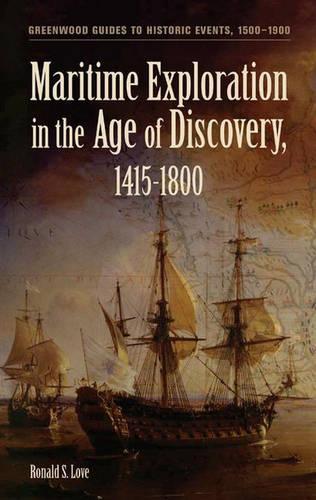
Maritime Exploration in the Age of Discovery, 1415-1800
(Hardback)
Publishing Details
Maritime Exploration in the Age of Discovery, 1415-1800
By (Author) Ronald S. Love
Bloomsbury Publishing PLC
Greenwood Press
30th September 2006
United States
Classifications
Tertiary Education
Non Fiction
Geographical discovery and exploration
910.45
Physical Properties
Hardback
248
Width 156mm, Height 235mm
510g
Description
Despite earlier naval expeditions undertaken for reasons of diplomacy or trade, it wasn't until the early 1400s that European maritime explorers established sea routes through most of the globe's inhabited regions, uniting a divided earth into a single system of navigation. From the early Portuguese and Spanish quests for gold and glory, to later scientific explorations of land and culture, this new understanding of the world's geography created global trade, built empires, defined taste and alliances of power, and began the journey toward the cultural, political, and economic globalization in which we live today. Ronald Love's engaging narrative chapters guide the reader from Marco Polo's exploration of the Mongol empire to Ferdinand Magellan's circumnavigation of the globe, the search for a Northern Passage, Henry Hudson's voyage to Greenland, the discovery of Tahiti, the perils of scurvy, mutiny, and warring empires, and the eventual extension of Western influence into almost every corner of the globe. Biographies and primary documents round out the work.
Reviews
Contrary to the more usual Eurocentric presentations on the Age of Discovery, Maritime Exploration provides a balanced approach while setting the subject within the historical context in which the events occurred. The book is geared toward students in high school and the early years of college, but it is equally valuable to the general reader who wishes to learn about the men and voyages whose initial purpose was to find gateways to increase commerce, but eventually devolved into the quest for land, riches, and world domination. * Pirates and Privateers *
This is a concise survey of the geographic discoveries made by Europeans in the early modern period. Beginning with the Portuguese exploration of the west coast of Africa in the fourteenth century and ending with the Pacific voyages of Cook, Vancouver and Malaspina in the late eighteenth century, Ronald S. Love recounts the major events of European martime discovery in plain and accessible prose.This book accomplishes its goal of providing a comprehensive survey of topics essential for the seconday school and junior undergraduate students.This book will surely be a central text for instructors developing a new course for students at the senior secondary or junior undergraduate levels. * International Journal of Maritime History *
Aimed at student researchers at the high school and beginning undergraduate levels, this text covers the maritime exploration that drove European trade and imperial expansion during the period 1415- 1800. Following a chronology and historical overview, Love describes early Portuguese expeditions along the African coast. Other topics include the Spanish discovery of the Americas, the search for a northern passage to China, and the exploration of the Pacific. Supplementary materials include biographical profiles, excerpts from primary documents, a glossary, and an annotated bibliography. * Reference & Research Book News *
Author Bio
Ronald S. Love is Associate Professor of History at the University of West Georgia, Carrollton, GA. He is co-editor of Distant Lands and Diverse Cultures: The French Experience in Asia, 1600-1700 (Praeger 2002). and is currently completing a book-length study of Franco-Thai relations from 1660-1690.
